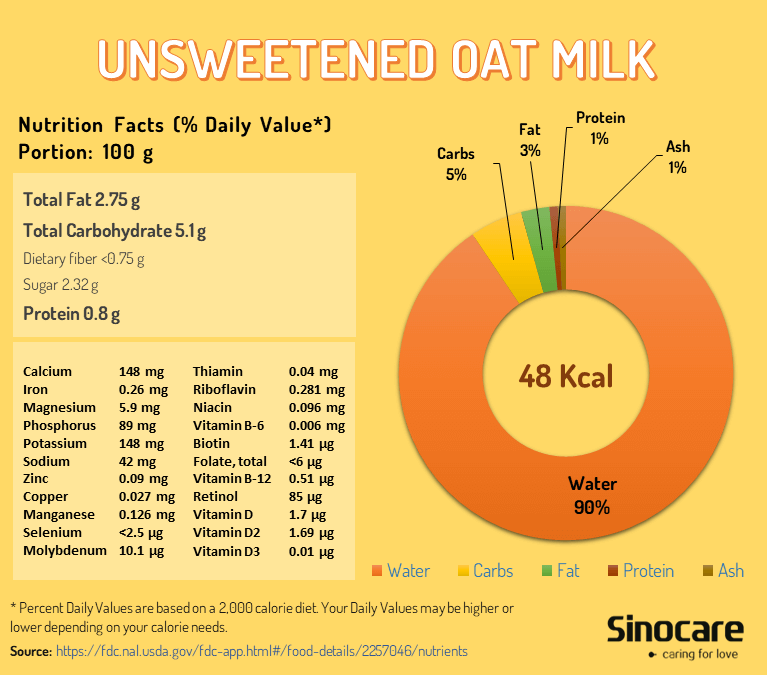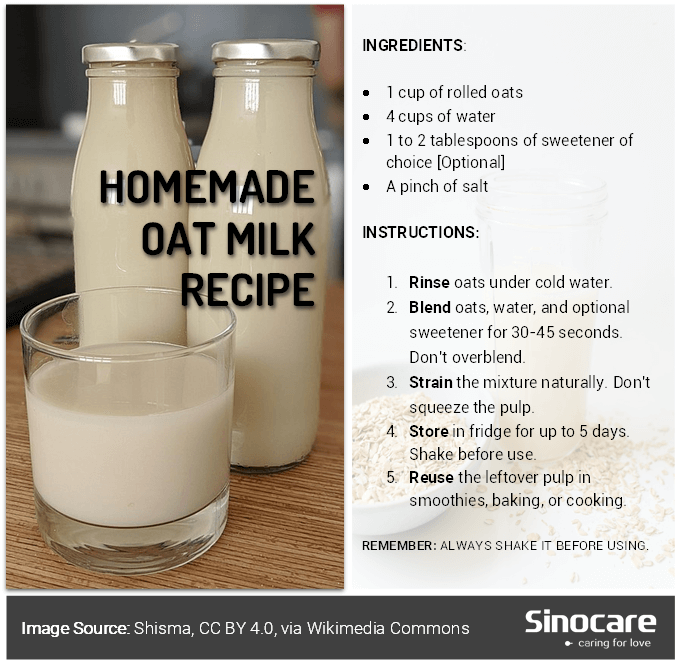Managing diabetes means making careful dietary choices to keep blood sugar levels in check. Many with diabetes thus consider switching to vegan or plant-focused diets. Some even substitute dairy milk with alternatives like oat milk.
Oat milk is a plant-based milk alternative made from oats. Diabetic patients often prefer this milk due to its high fibre but low calorie and fat content.
But is oat milk good for diabetics? This article delves into this question. It discusses the benefits and harms of drinking oat milk with diabetes and how it may affect blood glucose levels.
Nutrition Profile of (Unsweetened) Oat Milk
Oat milk contains a range of powerful nutrients beneficial for our overall health. It is a good source of heart-healthy fibre and essential vitamins.
The below infographic shows the nutritional contents of unsweetened oat milk.

Benefits of Having Oat Milk with Diabetes
Oat milk brings several benefits to the table for those with diabetes:
- Low glycaemic index (GI). Irrespective of the brand, unsweetened oat milk has a low to medium GI. [1] Hence, it is less likely to cause an undue spike in blood sugar levels.
- Low-fat content. Unsweetened oat milk is lower in fat than cow milk. Diabetic patients can try this milk to limit their fat intake and maintain a healthy weight. [2, 3]
- Rich in dietary fibre. Oat milk is a good source of fibre. A serving of oat milk provides about 1g of dietary fibre. So, drinking it can make those with diabetes feel full and satiated for longer. This feeling of satiety can prevent diabetics from eating other foods that could spike their blood sugar. [3]
- Nutrient-dense. Oat milk contains many beneficial nutrients like protein, iron, and potassium. It also provides calcium and vitamin D when fortified. Both of which are essential for bone health. In brief, these micronutrients can benefit the overall health of diabetic patients. [4]
- Vegan-friendly. Oat milk is free from lactose, nuts, and soy. So it is a suitable alternative for anyone allergic to these ingredients. Plus, as a plant-based milk, it fits perfectly into a vegan diet. [2-4]
Sugar Content and Glycaemic Index for Oat Milk
Oat milk typically has a low sugar content. However, this can vary based on the brand as well as the milk varieties – sweetened or unsweetened. Sweetened oat milk usually has more sugar than its unsweetened variety. [1, 2]
Commercial (sweetened) oat milk contains several grams of added sugar per serving. That’s despite the label listing no added sweetener. [5] The only carbohydrate source in oat milk is the oats themselves. So, where does this additional sugar come from?
The answer lies in the processing of oats. Enzymes added during manufacturing convert the oat starch into simple sugar, primarily maltose. The sweet taste of oat milk comes from it. [1]
However, what’s concerning is that maltose has a GI of 105. [6] That means the GI of maltose is even higher than the range of the GI scale (0-100). As such, drinking oat milk can cause a rapid spike in blood sugar.
Therefore, those with diabetes should avoid sweetened oat milk at all costs. This is because even the unsweetened variety contains natural sugars, which can rapidly raise blood sugar levels.
Note: the GI of raw oat milk is only 30, while commercially produced oat milk has a GI of 60-66. [1, 7]
Cons of Drinking Oat Milk for Diabetics
- High carbohydrate content. It is the main downside of drinking oat milk for people with diabetes. Oat milk contains approximately 14-22g of carbs per serving, depending on the brand. [1, 3]
- Presence of maltose. As stated above, oat milk contains a specific type of sugar called maltose. This maltose has a GI of 105 – that’s even higher than table sugar.
- High added sugar content. One cup (240ml) of oat milk contains around 7g of added sugars. [5] That means a 12-ounce glass of oat milk could impact blood sugar similarly to a 12-ounce can of Coke.
- Artificial fillers and preservatives. Some oat milk brands use these, which could have adverse health effects.
- Lack of natural nutrients. Unlike cow’s milk, oat milk does not naturally contain calcium and several other vitamins. [8] So unless fortified, teens and adults who need calcium won’t get it from this milk.
- Less suitable for infants and children. Oat milk has less protein and fat content than cow’s milk. However, infants and children need more of these two nutrients for their growth. [8, 9] Hence, it’s not a suitable nutritional substitute for young children, especially those allergic to cow’s milk.
Side Effects of Overdrinking Oat Milk
Overdrinking oat milk can cause several side effects. These may include:
- Excessive sugar intake. This could rapidly spike blood sugar levels and cause undesirable discomfort for those with diabetes.
- More calorie consumption. Oat milk naturally has more calories than other non-dairy milk. So overdrinking without calorie adjustment can lead to weight gain.
- Diarrhoea. It’s the most common side effect of overdrinking oat milk. It occurs due to the high fibre content of oat milk.
Oat Milk, Cow’s Milk, Almond Milk, Soy Milk, Which Is Better for Diabetics?
Cow’s milk has the best nutrient profile of all milk drinks. [8-10] So, unless someone is allergic or intolerant to cow’s milk, the first choice should always be low-fat cow’s milk.
The low-fat dairy milk, however, can be off the table due to intolerances or allergies. In that case, diabetic patients can choose a non-dairy substitute that meets their dietary needs. But before incorporating it into their diet, they should ensure they are not allergic, intolerant, or sensitive to the milk substitute.
There is no clear winner among the oat, almond, and soy milk substitutes. Each has benefits and drawbacks of their own. [2, 3]
Unsweetened oat milk has a similar calorie and carb content to low-fat cow’s milk. It also provides more fibre than cow’s milk. But it has fewer proteins and more sugars compared to cow’s milk. [8, 11]
Almond milk is lower in fats, calories, and carbs than cow’s milk but lacks protein. Soy milk, however, provides a good balance of protein, carbs, and calories. It also contains isoflavones, which can protect against heart disease, cancer, osteoporosis, and several other age-related diseases. [12]
However, some diabetic patients can be allergic or sensitive to nuts or soy. So, they should choose a milk substitute based on their dietary needs and tolerances.
Why Cow’s Milk Is Better Than Oat Milk?
Nutritionists regard the nutrient profile of cow’s milk as the gold standard for all milk drinks. [8-10] It provides about 8g of protein per cup. That means that a cup of cow’s milk can meet the daily protein requirements of 60% of babies and 40% of children.
Cow’s milk proteins are also of high quality. They consist of 80% casein and 20% whey. Both contain all nine essential amino acids. Cow’s milk is also high in calcium, iodine, and several vitamins. [9]
In contrast, a cup of oat milk provides only 3g of protein. [5] It contains more carbs per serving than cow’s milk. Also, it has a naturally low calcium content. The only area where oat milk outperforms cow’s milk nutritionally is fibre content.
Frequently Asked Questions (FAQs)
Can Diabetics Drink Oat Milk at Night?
Yes, those with diabetes can drink oat milk at night. However, they should choose the unsweetened variety to avoid blood sugar spikes.
Is Lactose-Free Milk Good for Diabetics?
Not everyone with diabetes needs lactose-free milk. This milk product is for those who have lactose intolerance. Lactose is a sugar found naturally in mammalian milk. Lactose-free milk is simply regular milk without lactose. And it has a similar nutritional profile to regular milk. [13]
How to Make Sugar-Friendly Oat Milk at Home
Making sugar-friendly oat milk is surprisingly easy. All you need are oats, water, and a blender.
- Mix 1 cup of oats with 4 cups of water in a blender
- Blend until smooth
- Strain the mixture
- Enjoy!

For a sugar-friendly version, avoid adding sweeteners.
Final Thoughts
Unsweetened oat milk can indeed be a good choice for those with diabetes. It offers a good source of fibre and has few calories and fat. The fortified version of it can also provide calcium, vitamin D, and other necessary nutrients.
However, its sugar content, particularly the presence of maltose, is a concern. Diabetic patients should consult a healthcare professional before adding it to their diet.
References
- Jeske S, Zannini E, Arendt EK. Evaluation of physicochemical and glycaemic properties of commercial plant-based milk substitutes. Plant Foods for Human Nutrition. 2017 Mar;72:26-33.
- Shkembi B, Huppertz T. Glycemic Responses of Milk and Plant-Based Drinks: Food Matrix Effects. Foods. 2023 Jan;12(3):453.
- Sethi S, Tyagi SK, Anurag RK. Plant-based milk alternatives an emerging segment of functional beverages: a review. Journal of food science and technology. 2016 Sep;53:3408-23.
- Wehrli F, Taneri PE, Bano A, Bally L, Blekkenhorst LC, Bussler W, Metzger B, Minder B, Glisic M, Muka T, Kern H. Oat intake and risk of type 2 diabetes, cardiovascular disease and all-cause mortality: a systematic review and meta-analysis. Nutrients. 2021 Jul 26;13(8):2560.
- Food Data central [Internet]. Usda.gov. [cited 2023 May 16]. Available from: https://fdc.nal.usda.gov/fdc-app.html#/food-details/719016/nutrients.
- PBS Food [Internet]. 5 Sugars & Sweeteners Everyone Should Know. [cited 2023 May 16]. Available from: https://www.pbs.org/food/features/5-sugars-sweeteners-everyone-know/.
- Oat milk (raw) [Internet]. Glycemic Index Guide. [cited 2023 May 16]. Available from: https://glycemic-index.net/oat-milk-raw/.
- Collard KM, McCormick DP. A nutritional comparison of cow’s milk and alternative milk products. Academic Pediatrics. 2021 Aug 1;21(6):1067-9.
- Walther B, Guggisberg D, Badertscher R, Egger L, Portmann R, Dubois S, Haldimann M, Kopf-Bolanz K, Rhyn P, Zoller O, Veraguth R. Comparison of nutritional composition between plant-based drinks and cow’s milk. Frontiers in Nutrition. 2022 Oct 28;9:2645.
- Vanga SK, Raghavan V. How well do plant based alternatives fare nutritionally compared to cow’s milk?. Journal of food science and technology. 2018 Jan;55(1):10-20.
- Food Data central [Internet]. Usda.gov. [cited 2023 May 16]. Available from: https://fdc.nal.usda.gov/fdc-app.html#/food-details/2257046/nutrients.
- Kim IS. Current perspectives on the beneficial effects of soybean isoflavones and their metabolites for humans. Antioxidants. 2021 Jun 30;10(7):1064.
- Facioni MS, Raspini B, Pivari F, Dogliotti E, Cena H. Nutritional management of lactose intolerance: the importance of diet and food labelling. Journal of translational medicine. 2020 Dec;18:1-9.


